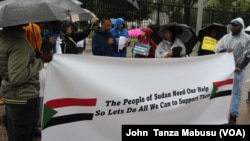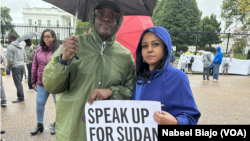Dozens of Sudanese Americans gathered at the White House Saturday, despite heavy rain, rallying for support for those affected by the relentless conflict in their home country.
Fatima Ramram, a Sudanese American participant, shared her family's heart-wrenching ordeal. Her family was forced to flee Sudan's capital, Khartoum, with some seeking refuge in the northern regions of the country, while others became refugees in Egypt.
“We need attention from President Biden. We need help for Sudanese people who are suffering. They need shelter, food, safety, and a safe place for children,” Ramram pleaded. “I witnessed people in Egypt, a woman with five kids, who have nothing. They sleep on the floor without food. One of the children, an eight-year-old, was raped, and they have nothing – no food, safety, or shelter.”
Israa Nur, another demonstrator, urged U.S. President Joe Biden to push for a peaceful resolution to the Sudanese conflict, which has claimed thousands of lives and displaced millions.
“It's a huge humanitarian crisis right now. People are dying. There isn't enough medical infrastructure, humanitarian aid pathways. Millions have been evacuated, more than from Afghanistan, Iraq, Syria, and Yemen,” Nur emphasized. “It's an absolutely horrendous situation in Sudan. I'm here to raise awareness and advocate for the voices of the Sudanese who are unable to be here. We hope to see a political solution in this war and that all warring parties return to the negotiating table.”
Nur acknowledged the Biden administration's efforts through the Jeddah platform to broker ceasefires in Sudan and the individual sanctions imposed by the State Department on two leaders of the paramilitary group, the RSF, including the brother of its leader, Abdelrahim Hamdan Dagalo. However, she believes that more significant action is needed.
“I think this administration has done a lot to raise awareness and try to cease hostilities for a long-term ceasefire. But there could always be more done. I think just sanctioning Abdul Dagalo is not enough. I don't think that the sanctions right now will really move the needle for them. So we need to see some bold movement from this administration and Congress.”
Khidir Dalouk, a board member of the Sudanese-American Physicians Association and one of the rally's organizers, highlighted the dire situation in hospitals and the shortage of medical supplies caused by the ongoing conflict in Sudan.
“80% of hospitals are shut down. The situation in Darfur is even worse. Almost 14 million children need urgent humanitarian assistance, including vaccines. Kids are dying from malnutrition, with about three to five of them dying every day in any hospital. The healthcare system is crumbling, and if we don't act now, we won't be able to save the people.”
Saturday’s rally was organized by international non-governmental organizations, including Amnesty International USA, Human Rights Watch, Refugees International, Refugee Congress, as well as Sudanese groups such as Sudan Unlimited, Act for Sudan, and Girifna.
Meanwhile, in Sudan's capital, Khartoum, a humanitarian crisis is deepening due to the nearly six months of fighting between the Sudan Armed Forces and the paramilitary Rapid Support Forces. Aid agencies are struggling to reach conflict zones, leading to severe shortages of basic food commodities.
Eyewitnesses report ongoing fighting in and around the military headquarters and in Omdurman, leaving civilians trapped and unable to access essential supplies. Samia Argawi, a Khartoum resident, described the situation as dire, with heavy artillery and airstrikes in recent days.
“Our house was subjected to looting, and everything was taken, including beds. My office space was also looted, including air conditioning, a fan, and a car. We were stranded in Arkaweet for two months without water and electricity.”
Thousands of civilians remain trapped in Khartoum, Omdurman, and Bahri since the conflict began in mid-April. The residents are growing increasingly concerned about the ongoing violence and its impact on their daily lives.
Mashair Ahmed, communicating from Omdurman, reported that living conditions have significantly deteriorated, with many families unable to access food due to shortages.
“The shop owners are careful nowadays and only open shops for a few hours in the morning. This is due to the continuation of confrontation, or they fear looting.”
Munir Hassan, another Khartoum resident, called for an end to the fighting and a move towards dialogue as the military solution has not yielded results.
“Military solutions have failed in the past. It's been a long time with no success. Let them choose the option of peace talks.”
The United Nations Office for the Coordination of Humanitarian Affairs (UNOCHA) in Sudan released a statement, revealing that fighting has internally displaced over 4.1 million people across the country. Many others have been cut off from basic services in Khartoum, Darfur, and Kordofan states, with food prices skyrocketing when available.
Contributing to this report was Michael Atit in Juba.










Forum